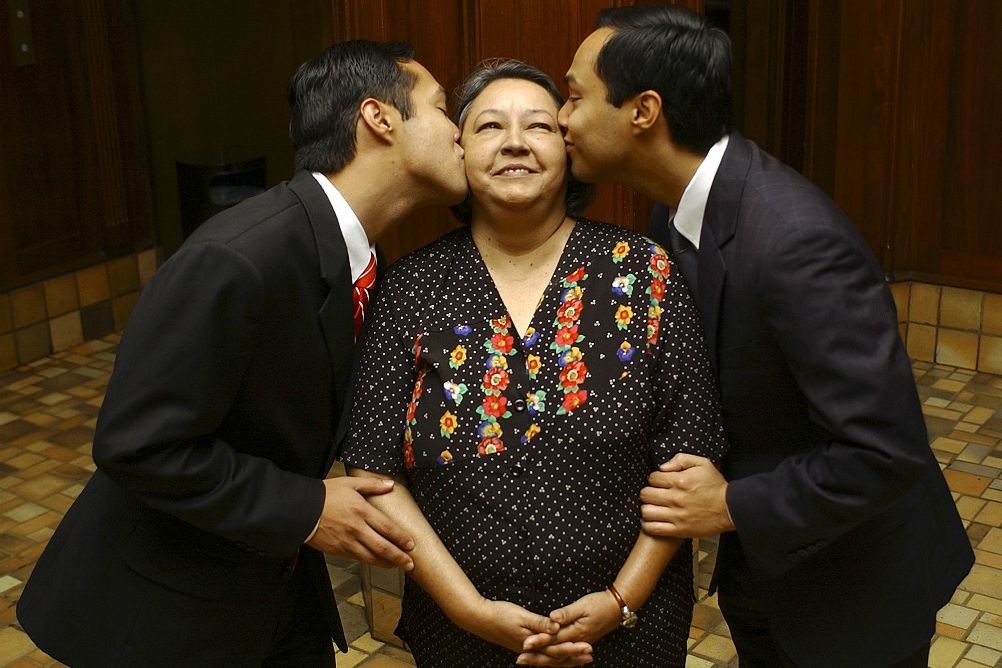
Rosie Castro with her sons, Joaquín, left, and Julián, April 23, 2006 (ZUMA Wire/San Antonio Express-News/Helen L. Montoya)
During the first Democratic debate last month, it took presidential candidate Julián Castro five words to mention his mother. Asked about fair pay for women, Castro responded: "I grew up with a mother who raised my brother Joaquín and me as a single parent."
"I know what it's like to struggle," he continued. "I know what it's like to rent a home and worry about whether you're going to be able to pay the rent on the first of the month, to see a mom work very hard and know that moms across the country are getting paid less because they're women."
That hard-working mom that he refers to is Maria del Rosario "Rosie" Castro, the daughter of an immigrant and herself a prominent Mexican American social justice and political activist in the San Antonio area. She also has been involved with several Catholic groups, including Network, a national lobby of Catholic nuns, and a San Antonio shelter and transitional housing center for women founded by two sisters of Charity of the Incarnate Word.
Castro, now 72, has clearly been the dominant influence on her twin sons, born Sept. 16, 1974.
Julián Castro, who is one minute older than Joaquín, served two terms as mayor of San Antonio before becoming Secretary of Housing and Urban Development under President Barack Obama. Joaquin Castro represents Texas' 20th District in the U.S. House of Representatives and served five terms in the Texas House. The younger twin is campaign chair for his brother's presidential bid, having dispelled rumors of him challenging Texas GOP Sen. John Cornyn.
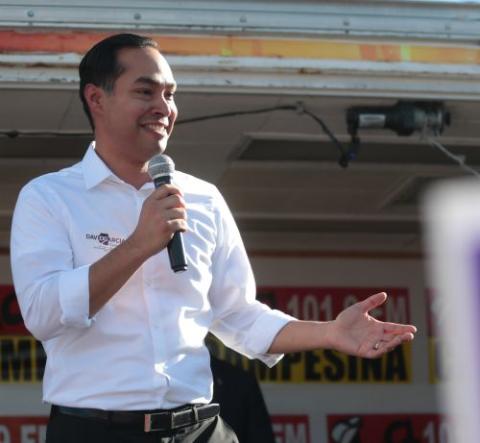
Julián Castro speaking with supporters at a campaign rally for Democratic gubernatorial nominee David Garcia at Azukar Coffee in Phoenix, Arizona, Oct. 10, 2018 (Wikimedia Commons/Gage Skidmore)
Like any parent, Castro is proud of her son's accomplishments, including their degrees from Stanford University and Harvard Law School, their successful campaigns for elected office (especially since her own, a run for San Antonio City Council in 1971, was not), and for her grandchildren.
But what she most admires is how her sons try to make the world a better place, a value she credits as coming from her Catholic faith and one she worked to instill in them.
"Both are very strong in terms of caring about people and respecting people. That was something since they were very young," Castro told NCR.
The Castro sons' commitment to justice and equality comes from their mother, say those who know her.
"She is the ultimate example of the struggling single mother who really fought and prepared her boys to change the world," said Sr. Yolanda Tarango. A Sister of Charity of the Incarnate Word, Tarango is co-founder and executive director of Visitation House, which provides transitional housing and education for women in San Antonio.
Castro, whom Tarango calls "a true civic servant," has been a long supporter of Visitation House, as have the Castro sons.
"I have the highest respect for her," said Tarango, who has known Castro since the 1980s. "Her life has been about her children, really preparing them to be civil servants."
A life of public service
Castro's own public service began in college, when a professor and mentor introduced her to the Democratic Party and local officials. She quickly learned that having a seat at the political table was key to improving her community.
"If you're not there, you're invisible. Nobody cares," she said.
She organized a chapter of the Young Democrats at Our Lady of the Lake College, but first had to help organize a Young Republicans group, as was required for political clubs on campus. By age 20, she was testifying before the state Senate in favor of lowering the voting age to 18.
As president of Young Democrats, she went door to door, registered voters and passed out bumper stickers. "We were like the bumper sticker queens," she recalled.
But her social justice consciousness goes back to her childhood on San Antonio's West Side, where lack of housing, transportation and infrastructure trapped families in a cycle of institutional poverty, racism and discrimination.
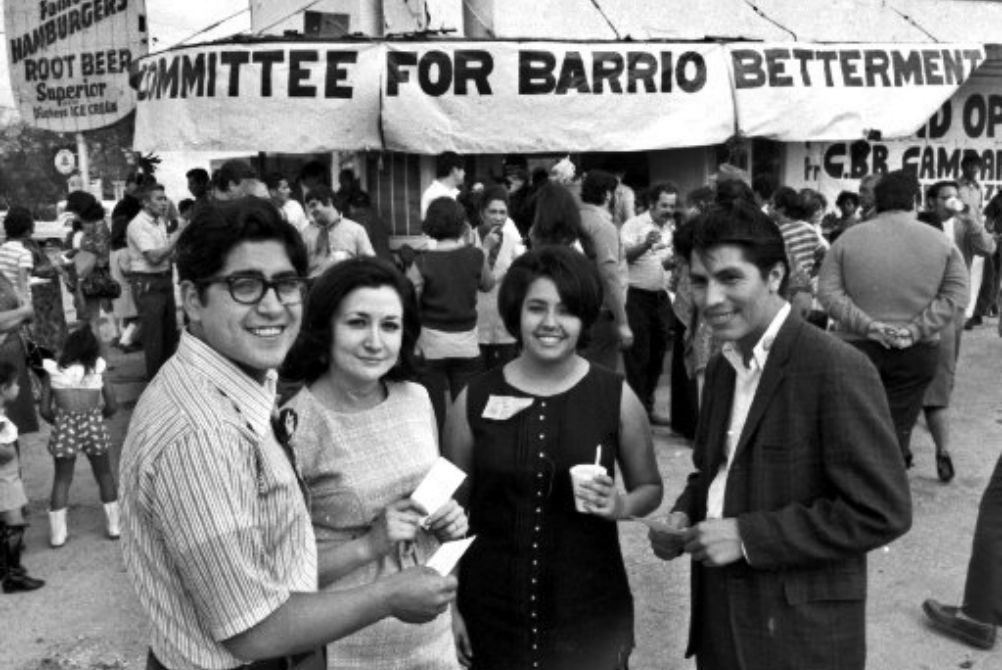
From left, William Benavides, Gloria Cabrera, Rosie Castro and Mario Compean in 1971 during their San Antonio City Council campaign (UTSA/San Antonio Express-News via ZUMA Press)
"You could see the glaring realities between people of color who lived on one side of town, and those who had privilege on the other side of town," she recalled.
Young Castro witnessed the disparity when she accompanied her mother, Victoria, who worked several domestic jobs for wealthier families, earning little money and even less respect. Castro recalls one employer accusing her mother of stealing a pan, while another made her retrieve an alcoholic son from the local bars. Another had young Rosie pick ticks off the family dog.
Her mother, who left school after third grade and taught herself to read and write in Spanish and English, stressed education for her daughter.
"I could see [my mother] working hard and getting nowhere fast," Castro recalled. "I wanted to do better financially, but also really felt I wanted to do something that would help folks in a similar situation."
Castro attended Little Flower Catholic School for 12 years, where she graduated as valedictorian. A scholarship helped her attend Our Lady of the Lake College, founded by the Sisters of the Congregation of Divine Providence*, whom she credits with providing educational opportunities she otherwise would not have had.
After college — and disillusioned by lack of action and inclusion in the major political parties — Castro got involved with the Raza Unida Party and the Committee for Barrio Betterment in the 1970s to increase the number of Latino candidates and city officials. She ran for City Council, finishing second among four candidates.
She also was part of protests organized by the Mexican American Legal Defense Fund against lack of higher education opportunities and the boycott of the San Antonio Savings Association (headed by the mayor) by the Mexican American Unity Council.
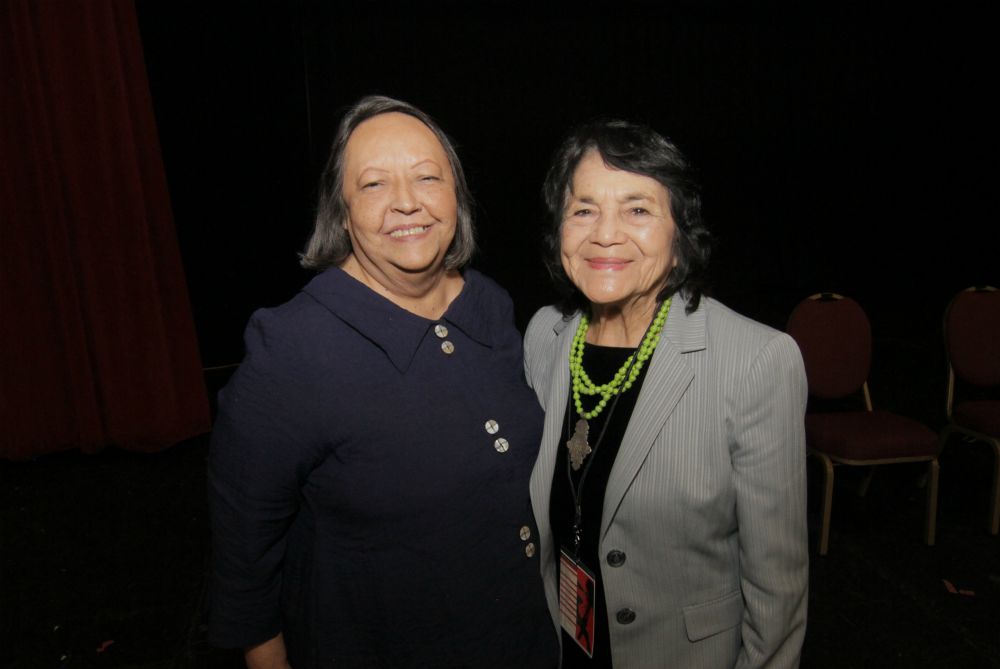
Maria del Rosario "Rosie" Castro, left, with Dolores Clara Fernández Huerta at a screening of the documentary "Dolores" at the Guadalupe Theater in San Antonio in February 2016 (Flickr/Ray Santisteban)
"It was a time when we didn't see ourselves reflected in politics, and we knew that the politics that were being created had nothing to do with our needs," she said.
Castro went on to work as a liaison to the city's personnel department director, doing special projects to increase the number of women in the police and fire departments. She earned a master's degree in public administration and taught courses at local community colleges, eventually became an administrator at Palo Alto College before retiring.
In the 1990s, she served on the board of Network, a national social justice lobby of Catholic sisters. Then-executive director Sr. Nancy Sylvester recalls the women religious being impressed with Castro's ability to juggle volunteerism, work and motherhood.
"She was a great organizer and had a real love of politics," recalled Sylvester, an Immaculate Heart of Mary sister and founder of the Institute for Communal Contemplation and Dialogue. "I remember clearly her voice was always one that would consistently be for the poorest of the poor."
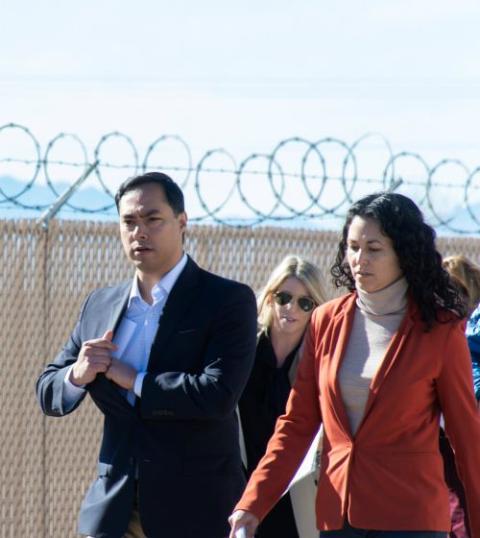
Rep. Joaquín Castro and Rep. Xochitl Torres Small exit after touring a Border Patrol substation in Alamogordo, New Mexico, Jan. 7. (CNS/Reuters/Julio-Cesar Chavez)
'My faith is still strong'
Castro grew up with daily Mass and nightly praying of the rosary and credits her faith as the foundation for her activism. "The Gospels have been really very instrumental in formulating my thoughts and worldview that the discrimination we saw was not what Christ intended," she said.
Later in life, Castro struggled with the "paternalism" of Catholicism, especially at a time when some in the church counseled victims of domestic violence to return to their husbands. But she is grateful that Mexicans and Mexican-Americans have in Our Lady of Guadalupe an image of a strong woman.
She has been frustrated in the past by the church's lack of attention to issues that matter to her, including immigration reform. But today Castro is proud of the Catholic Church, especially along the border, for its "prominent role in trying to help immigrants," she said.
She also praised the late Archbishop Patrick Flores, the first Mexican-American bishop in the United States, calling him a "real fighter." Castro served with him on the U.S. Commission on Civil Rights' Texas Advisory Committee in the '70s.
"My faith is still strong," Castro said, admitting that she is a regular Massgoer, though "not every Sunday."
"I pray every day and every night. I have a lot to pray for, too," she said. "That's never going to go away."
Although her sons did not attend Catholic school (except for one year), she raised them in the faith and taught them what she thought was important in the Gospels: "compassion, fairness to people, the whole idea of the love of God and love of neighbor, how your life has to have meaning, and that meaning is how you care for other people."
Advertisement
She recognizes that some will disagree with her son Julián's position on abortion. He stated in the debate that not only was he for "reproductive freedom" but also "reproductive justice," and thus would appoint judges who "understand the precedent of Roe v. Wade."
Her own position "has always been that I would not have an abortion, but I don't feel I can tell you you can't have one," she said. "I'm sure there will be folks who feel you're not a Catholic if you espouse the right of women to choose. But [Julián] feels strongly about that."
Rosie said Julián is very "intelligent, thoughtful and strategic" when considering his opinions on issues. "Whatever it is — housing, education, immigration — he really thinks about the steps that would help people to get the best possible outcome," she said.
Both sons, she said, are able to "maintain their own ideas but are not disrespectful to other ideas."
Family friend Irma Mireles Berry thinks Julián "would be a great leader for our country and our youth," she said. "He would be the perfect role model. He believes in social justice and is willing speak up for social justice."
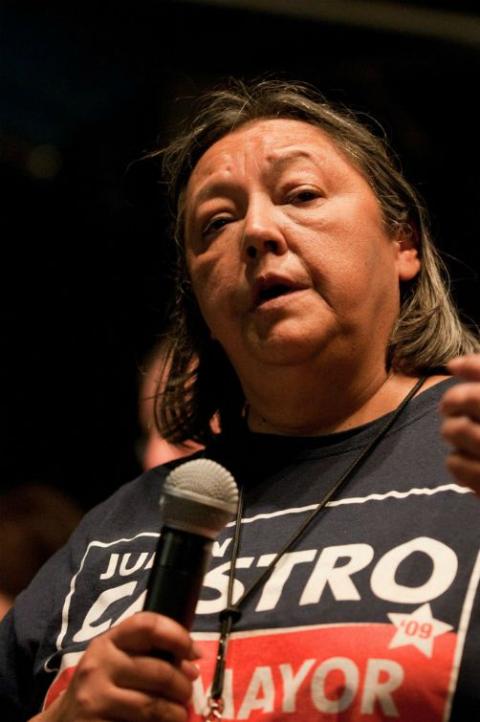
Rosie Castro speaking on election night May 9, 2009, in San Antonio (Flickr/Rosie Castro)
Berry, who is madrina (godmother) to Joaquín, also uses the phrase "role model" to describe Rosie. "She was actually ahead of her time," she said, referring to Castro's early activism. "She was willing to take risks because she believed in what she was doing."
While her sons still ask their mom for advice, perhaps Rosie's biggest contribution these days is as babysitter to her four grandchildren, Berry said.
Both Castro sons have publicly thanked their foremothers for their success. As the first Latino to address a Democratic National Convention, in 2012, Julián praised his grandmother who "cleaned other people's houses so she could afford to rent her own, but she saw her daughter become the first in her family to graduate from college."
He added, "And my mother fought hard for civil rights so that instead of a mop, I could hold this microphone."
* The name of the college's founding community has been corrected.
[Heidi Schlumpf is NCR national correspondent. Her email address is hschlumpf@ncronline.org. Follow her on Twitter: @HeidiSchlumpf.]




